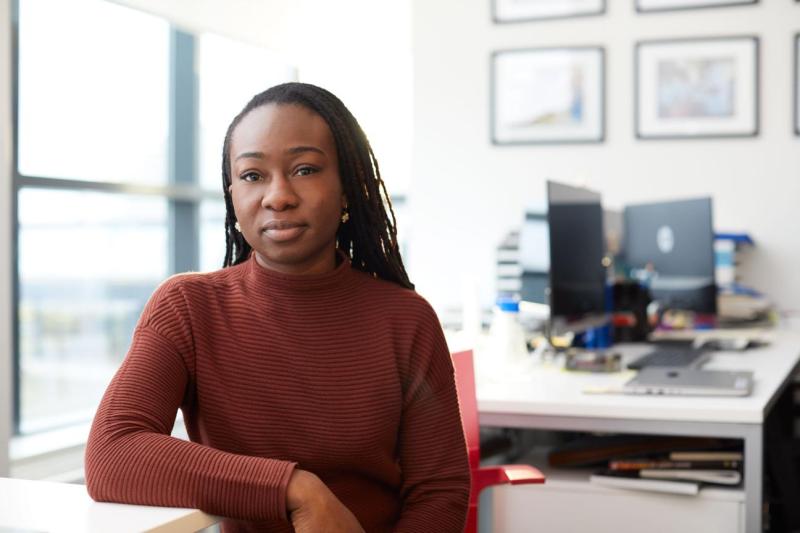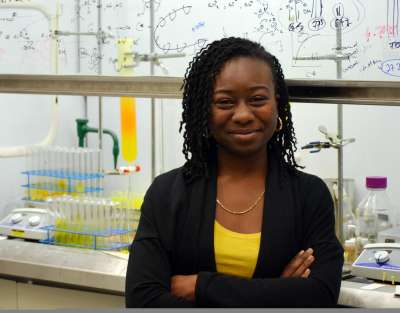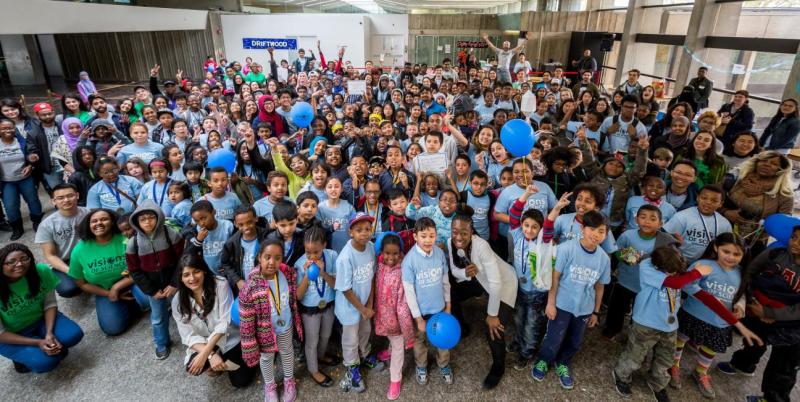November 8, 2022 | Alumni
A world where any kid could choose science: Eugenia Addy is UTM’s Outstanding Young Alum
By Negin Neghabat-Wolthoff

Photo by TD
For U of T Mississauga alumna Dr. Eugenia Addy (née Duodu) (HBSc 2010, PhD 2015), love of science and community go hand-in-hand. In her role as CEO of Visions of Science, she leads the nonprofit organization in facilitating community-based STEM youth engagement, strengthening youth support networks, and advocating for broader systems change by creating equitable access to education in science, technology, engineering and math.
In recognition of her outstanding achievements and contributions, she has now been awarded the 2022 Desmond Parker Outstanding Young Alumni Award.
Congratulations! What does this award mean to you?
I’ve had such a wonderful journey at U of T and UTM, specifically, and this award commemorates that. It’s also an amazing opportunity to return to campus [for the award ceremony]!
The other thing is that I really admire the previous AAD winners, so I feel honoured to be in such esteemed company. And, of course, the award itself is such an honour. It’s both very humbling and encouraging at the same time.
Can you tell us more about your path into science?
I grew up in a community in west Toronto. I’ve always felt deeply connected to the incredible people around me and had this deep-rooted sense of community instilled in me from a young age.

Growing up, I attended several different schools in the city, in hopes of getting a really good education, to be able to live up to the potential my mom saw in me. I encountered various challenges in elementary and middle school, but also had incredible teachers who were motivating and encouraging, who helped me foster this passion and love for science that started at a very young age.
However, there were also times when I felt very discouraged, mostly because of things I would hear around me. A feeling of non-belonging in the science field would often set in.
Being connected to the university, spending time on campus -- it helped me gain confidence in my abilities and capabilities
It was not until high school when my passion for science got fully reignited. In my senior year, I had the opportunity to be part of the Summer Mentorship Program at U of T, and it was a total game-changer. Being connected to the university, spending time on campus -- it helped me gain confidence in my abilities and capabilities. And that really set me on a path to pursuing science for my post-secondary education!
You often talk about the important role that teachers and mentors played in your life. Who stood out for you?
The first prof that really changed the game for me was Dr. Michael Georges; he taught organic chemistry at UTM. I had heard that his class was tough before starting, and it was! But every single class was also riveting! He had this unique way of teaching that resonated with me. That class became a turning point for me when it came to the hard sciences. I realized that I could do chemistry, that I could do the “hard” sciences, too.
Meeting my future supervisor, Dr. Patrick Gunning, was also pivotal to me. It was inspiring to meet someone so accomplished and, yet, so down to earth. And, of course, he had a lasting impact as my supervising professor for my PhD!
Dr. Ulli Krull was another influential professor, starting with me taking his Analytical Chemistry course. He was an incredible supporter, even on my journey post university. I could go on to name the whole faculty of the Department of Chemical and Physical Sciences. Every professor I interacted with inspired me in one way or another!
Thinking about the stereotypes and boundaries you have had to face being a woman and a Person of Colour, what advice do you have for others facing similar challenges?
Over the years, I recognized more and more that how I felt about myself and my abilities was really a symptom or a result of my position in society. I’m now much better able to really understand that, specifically how these boundaries impact my day-to-day life and how I am perceived by the world.
Recognizing how these boundaries impact my day-to-day life and how I am perceived has allowed me to be much bolder about holding the systems that I interact with accountable
Recognizing that has allowed me to be much bolder about holding the systems that I interact with accountable. Many Black women and racialized youth from low-income communities are navigating similar and worse challenges than those I encountered, and I think I have a responsibility to speak up about my experiences and advocate for better conditions.
My advice to youth is to remember that you have the right to every single opportunity out there and that those opportunities should be presented to you equally. Make sure to demand that and to advocate for yourself. And, don't be afraid to get the support you need to be able to achieve all that it is that you want.
How did your community nurture and support you?
I have always been connected to community. It has been particularly important to me, growing up without extended family, to have people to lean on.
During my studies, going through all-nighters, going through tough times, facing new challenges, I always knew my community was supporting me. And I also knew that I wasn’t doing all this hard work and studying just for myself, but also for the benefit of those around me. It was important to me to be visible in my community, to remain connected and engaged and to set the example that you can go to university and accomplish things and still remain connected.
My community has always kept me grounded and, ultimately, led me to the work I’m doing now. Seeing the impact that communities like the one I grew up in can have in organizing and supporting one another, especially in the face of challenges and systemic barriers that might feel insurmountable if you were going through them alone, has hugely influenced my career path.

Where do you see Visions of Science headed?
I think that our organization is probably entering its most exciting stage. For one, we are in the midst of re-engaging in-person programming. Before the pandemic, our work was important, but the pandemic highlighted the urgency of the work that we do, and the urgency to fill educational gaps and address barriers head-on.
But, at the same time, I’m also really excited that we're looking to expand our reach and impact, as well positioning our programming towards systematic change.
QUOTE what would a world look like that offered equitable opportunities for everyone to access and engage and grow and navigate through STEM?
I ask myself this: what would a world look like that offered equitable opportunities for everyone to access and engage and grow and navigate through STEM? What would that kind of society look like, and what kinds of innovations would we have?
At Visions of Science, we are thinking and dreaming much bigger than ever before. And what’s been amazing to see over the past few years is that those dreams have been backed by support and funding! Seeing that people are willing to invest in the future of this vision, and that they believe in it, gets me excited!

